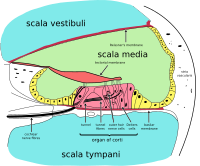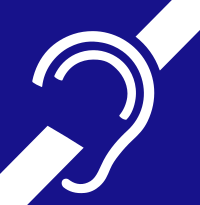
Active role of glia‐like supporting cells in the organ of Corti: Membrane proteins and their roles in hearing
Sign Up to like & getrecommendations! Published in 2022 at "Glia"
DOI: 10.1002/glia.24229
Abstract: The organ of Corti, located in the cochlea in the inner ear, is one of the major sensory organs involved in hearing. The organ of Corti consists of hair cells, glia‐like supporting cells, and the… read more here.
Keywords: membrane proteins; like supporting; organ corti; glia like ... See more keywords

ERBB2 signaling drives supporting cell proliferation in vitro and apparent supernumerary hair cell formation in vivo in the neonatal mouse cochlea
Sign Up to like & getrecommendations! Published in 2018 at "European Journal of Neuroscience"
DOI: 10.1111/ejn.14183
Abstract: In mammals, cochlear hair cells are not regenerated once they are lost, leading to permanent hearing deficits. In other vertebrates, the adjacent supporting cells act as a stem cell compartment, in that they both proliferate… read more here.
Keywords: hair cell; hair cells; hair; supporting cells ... See more keywords

Efferent neurons control hearing sensitivity and protect hearing from noise through the regulation of gap junctions between cochlear supporting cells.
Sign Up to like & getrecommendations! Published in 2021 at "Journal of neurophysiology"
DOI: 10.1152/jn.00468.2021
Abstract: It is critical for hearing that the descending cochlear efferent system provide a negative feedback to hair cells to regulate hearing sensitivity and provide the protection of hearing from noise. Here, we report that the… read more here.
Keywords: hearing sensitivity; supporting cells; hearing noise; gap junctions ... See more keywords

LGR5-Positive Supporting Cells Survive Ototoxic Trauma in the Adult Mouse Cochlea
Sign Up to like & getrecommendations! Published in 2021 at "Frontiers in Molecular Neuroscience"
DOI: 10.3389/fnmol.2021.729625
Abstract: Sensorineural hearing loss is mainly caused by irreversible damage to sensory hair cells (HCs). A subgroup of supporting cells (SCs) in the cochlea express leucine-rich repeat-containing G-protein coupled receptor 5 (LGR5), a marker for tissue-resident… read more here.
Keywords: adult; lgr5 scs; ototoxic trauma; supporting cells ... See more keywords

Kölliker’s organ-supporting cells and cochlear auditory development
Sign Up to like & getrecommendations! Published in 2022 at "Frontiers in Molecular Neuroscience"
DOI: 10.3389/fnmol.2022.1031989
Abstract: The Kölliker’s organ is a transient cellular cluster structure in the development of the mammalian cochlea. It gradually degenerates from embryonic columnar cells to cuboidal cells in the internal sulcus at postnatal day 12 (P12)–P14,… read more here.
Keywords: supporting cells; lliker organ; auditory development;

Conditional Ablation of Glucocorticoid and Mineralocorticoid Receptors from Cochlear Supporting Cells Reveals Their Differential Roles for Hearing Sensitivity and Dynamics of Recovery from Noise-Induced Hearing Loss
Sign Up to like & getrecommendations! Published in 2023 at "International Journal of Molecular Sciences"
DOI: 10.3390/ijms24043320
Abstract: Endogenous glucocorticoids (GC) are known to modulate basic elements of cochlear physiology. These include both noise-induced injury and circadian rhythms. While GC signaling in the cochlea can directly influence auditory transduction via actions on hair… read more here.
Keywords: noise; noise exposure; ablation; cochlear supporting ... See more keywords

The Dual Roles of Triiodothyronine in Regulating the Morphology of Hair Cells and Supporting Cells during Critical Periods of Mouse Cochlear Development
Sign Up to like & getrecommendations! Published in 2023 at "International Journal of Molecular Sciences"
DOI: 10.3390/ijms24054559
Abstract: Clinically, thyroid-related diseases such as endemic iodine deficiency and congenital hypothyroidism are associated with hearing loss, suggesting that thyroid hormones are essential for the development of normal hearing. Triiodothyronine (T3) is the main active form… read more here.
Keywords: cells supporting; development; hair cells; dual roles ... See more keywords

Trehalose Suppresses Lysosomal Anomalies in Supporting Cells of Oocytes and Maintains Female Fertility
Sign Up to like & getrecommendations! Published in 2022 at "Nutrients"
DOI: 10.3390/nu14102156
Abstract: Supporting cells of oocytes, i.e., cumulus cells, control oocyte quality, which determines fertilization success. Therefore, the transformation of mature and immature cumulus cells (MCCs and ICCs, respectively) into dysmature cumulus cells (DCCs) with dead characteristics… read more here.
Keywords: lysosomal anomalies; cells oocytes; female fertility; cumulus cells ... See more keywords

Purinergic signaling in cochlear supporting cells reduces hair cell excitability by increasing the extracellular space
Sign Up to like & getrecommendations! Published in 2020 at "eLife"
DOI: 10.7554/elife.52160
Abstract: Neurons in developing sensory pathways exhibit spontaneous bursts of electrical activity that are critical for survival, maturation and circuit refinement. In the auditory system, intrinsically generated activity arises within the cochlea, but the molecular mechanisms… read more here.
Keywords: extracellular space; hair cell; purinergic signaling; supporting cells ... See more keywords